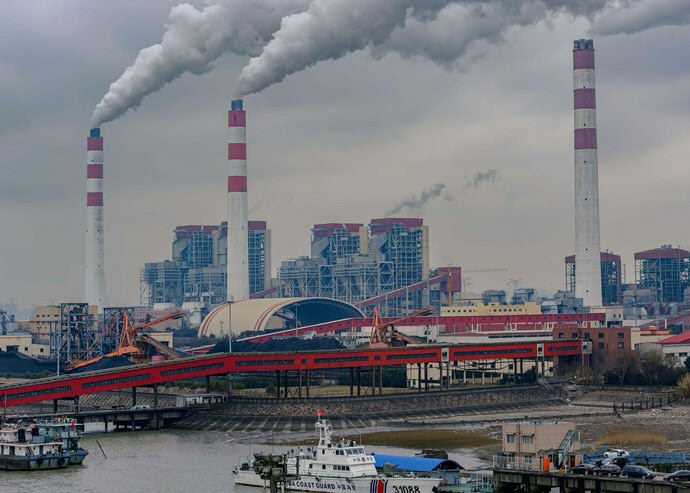Onze niet te stillen consumptiedrift stuwt de mondiale CO2-uitstoot

Veranderingen in de internationale handel hebben nauwelijks effect gehad op de wereldwijde groei van CO2-uitstoot. Die conclusie trekt hoogleraar Erik Dietzenbacher op basis van gegevens uit de World Input-Output Database (WIOD) tussen 1995-2008.
Tekst: Riepko Buikema
‘Dat is een verrassende conclusie, omdat de wereldhandel in die periode enorm is toegenomen. Een kwart van de wereldwijde CO2-emissie wordt veroorzaakt door goederen die elders worden geproduceerd. In het verleden is daarom veelvuldig de suggestie gewekt dat je veel uitstoot kunt voorkomen door spullen lokaal te produceren. Dat blijkt dus niet zo te zijn. Het verslepen van producten is niet de oorzaak van de sterke toename aan emissies. Grote veroorzaker zijn jij en ik, die steeds meer spullen kopen, en bovendien zijn we met steeds meer mensen. Het doet er dus vooral toe wát je eet en wát je koopt, maar niet waar je het vandaan haalt.’
Black-headed spider monkey
Een belangrijke, grote ontwikkeling van de afgelopen twintig jaar is dat productienetwerken zijn veranderd van lokale of nationale ketens naar wereldwijde ketens. Hulpstoffen en tussenproducten komen tegenwoordig uit alle hoeken van de wereld. ‘Die ketting gaat de wereld over. Alles wat jij hier als consument doet, heeft bijna onmiddellijk gevolgen aan de andere kant van de wereld. Vaak zonder dat jij daar weet van hebt. Ik gebruik vaak het voorbeeld van de black-headed spider monkey. Een aapje dat ernstig met uitsterven wordt bedreigd omdat oerwoud is gekapt ten behoeve van koffieplantages. Misschien wel vanwege de koffie die wij hier vanochtend drinken. We moeten ons veel bewuster worden van de effecten van ons consumptiepatroon.’

Emerging countries vs. het rijke Westen
Samen met zijn collega Iñaki Arto (Basque Centre for Climate Change) bekeek Dietzenbacher de geografische herkomst van de toenemende uitstoot van broeikasgassen. ‘Er wordt vaak gewezen naar de emerging countries zoals Brazilië, Rusland, India, Indonesië en China. Die landen groeien als een speer, worden rijker en rijker en zouden hun uitstoot nu ook maar eens fors moeten verminderen. Hun antwoord is natuurlijk dat een groot deel van hun emissies juist worden veroorzaakt door de rijke landen. Wij rijke westerlingen kopen immers al die spullen die worden gemaakt in de opkomende economieën.’
‘Uitvoer’ broeikasgassen
Dat verweer is deels terecht, zegt Dietzenbacher, maar tegelijkertijd moet die claim niet worden overdreven. In een andere studie toont hij aan dat het effect waarop het Chinese tegengeluid is gebaseerd (‘kijk naar jezelf, onze uitstoot wordt veroorzaakt om aan jullie vraag te kunnen voldoen’) met liefst 60% wordt overschat. ‘Voorheen schreef men alle Chinese uitstoot toe aan de Chinese productie als geheel. Wij hebben onderscheid gemaakt tussen assemblage (met relatief heel weinig uitstoot per geproduceerde dollar) en ‘normale’ productie in China (met relatief veel uitstoot per geproduceerde dollar). Aangezien ongeveer de helft van de Chinese exporten uit assemblage bestaat, maak je een flinke fout als je net doet alsof het ‘normale’ productie zou zijn. Met behulp van nieuwe data konden we zo aantonen dat China beduidend minder broeikasgassen uitvoert dan men dacht.’
Cultuuromslag
Niettemin bestaat er een groot verschil tussen de uitstoot die wordt veroorzaakt door arme en rijke landen. Dat is de belangrijkste boodschap van dit onderzoek, stelt Dietzenbacher. ‘Arme landen genereren uitstoot ten behoeve van de consumptie in rijke landen. En dat gat wordt eigenlijk steeds groter in plaats van dat het afneemt. Gelukkig is bij Westerse consumenten langzaam maar zeker een cultuuromslag zichtbaar. Lange tijd geloofde men dat producenten het voor het zeggen hebben. Maar consumenten vormen meer en meer een machtsblok. Zij dwingen af dat banken gaan opletten aan welke bedrijven zij leningen verstrekken en spreken Nike bijvoorbeeld aan op de kinderarbeid bij zijn leveranciers elders in de productieketen.’
Technische ontwikkeling dempt de uitstoot
In de loop van 2019 komt er een update beschikbaar van de energie en milieudata in WIOD. Dat biedt de mogelijkheid om onze berekeningen te actualiseren, zegt Dietzenbacher. ‘China zal een nog belangrijkere rol zijn gaan spelen, maar ik verwacht dat de algemene tendens er niet ineens heel anders uit zal zien. Verder zal blijken dat er wel degelijk al veel is bereikt met het opschonen van productieprocessen. De gemiddelde uitstoot per eenheid productie is de afgelopen vijftien jaar behoorlijk naar beneden gegaan. Het kan en moet nog veel beter, maar er zijn grote stappen gezet. Dat zie je ook in ons onderzoek. Zonder technische ontwikkeling zou de uitstoot bijna verdubbeld zijn als gevolg van de bevolkingsgroei en de stijgende consumptie per persoon. Door de gigantische technische verbetering is de uitstootgroei nog relatief gunstig uitgevallen. Dat effect is na 2008 alleen maar gecontinueerd, niet zozeer in Europa en VS maar vooral in de armere landen.’
Meer nieuws
-
10 februari 2026
‘Regeneratie begint waar moed en verbeeldingskracht samenkomen’
-
09 december 2025
Zijn robots de oplossing?
